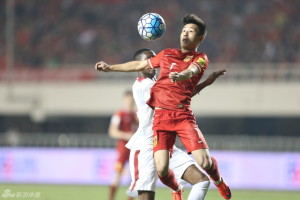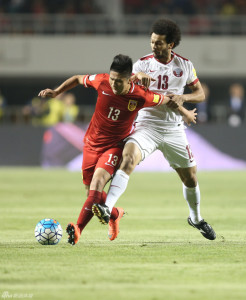China have edged in to the final round of Asian World Cup qualification thanks to a 2-0 win over Qatar. Second half goals from Huang Bowen and Wu Lei were enough to topple the Qataris and put China through as one of the best runners-up as results elsewhere went their way.
Qatar arrived in Xi’an knowing they had already won the group and fielded what was almost an entirely second string side. The weakened visitors, who had a 100% qualifying record coming into this clash, put up something of a fight, but China were the better side over 90 minutes and were rewarded with the victory.
2018 WC Qualifying, Asian Zone, Round 2, Group C E
China 2
Huang Bowen 57′
Wu Lei 88′
Qatar 0
However, they would not have advanced as one of the best runners-up had they not got lucky elsewhere, and the results of two early games fell their way, meaning that qualification was effectively secured by the time the final whistle blew in Xi’an. It was no surprise that Jordan were hammered 5-1 by Australia earlier in the evening, but North Korea, who were leading in the Philippines with seven minutes to go, capitulated to a 3-2 defeat that meant China would progress if they won.
And the wheels of victory were set in motion in the 57th minute when Huang Bowen rifled a 20-yard effort through a crowd of Qatari bodies following a goal mouth scramble. Wu Lei had taken advantage of a mistake from Abdulrahman Hussain to play a low cross into Li Xuepeng who looked certain to score until goalkeeper Amine Lecotme produced a stunning reflex save to keep his effort out. The ball then bounced to Yu Dabao who crashed it against the bar with the goal gaping, only for Huang to spare his blushes by finding the back of the net after Zhao Mingjian had done well cushion Khalid Muftah’s attempted clearance into the Guangzhou Evergrande midfielder’s path.
Yu had only been on the pitch five minutes when he missed that sitter, but his introduction at centre forward made a massive difference as it meant that Wu Lei shifted from the lone striking role to the wing in a move that significantly altered the game. Wu had been ineffective in the 52 minutes he spent up top and was guilty of wasting the hosts’ best two chances of the first half.
In the 26th minute Zhang Xizhe showed great vision to lift a quickly taken free kick over the Qatari back line to Wu who did well to chest it down before seeing his effort blocked. On that occasion, Hussain deserved credit for getting across and deflecting Wu’s strike, but the Shanghai SIPG attacker had no excuse five minutes before the interval when he allowed Li Xuepeng’s cutback to run behind him, before taking the ball off the feet of the better placed Jiang Ning and snapping a panicked effort woefully off target.
When Yu replaced Jiang Ning, who had a quiet game five days after netting a hat-trick against the Maldives, Wu moved out to the left wing and immediately helped bring China’s attack to life. This was shown when he provided the initial ball which led to Huang’s goal, and it was shown again when he ran onto a wonderful, delicately weighted through ball from Hao Junmin to score China’s second. Indeed, Wu gave Qatar right-back Mohamed Musa, one of the few regular starters in the visiting first eleven, a torrid time in the 30 minutes or so he squared off against him and showed how much more effective he can be as an attacker who is not responsible for leading the line.

Wu Lei in action as China’s centre forward in the first half
Wu’s late goal may have eased the nerves of players and fans who were now aware of North Korea’s implosion and knew that a win would send them through, but they needn’t have worried as Qatar offered little in attack. Star players Abdelkarim Hassan, Hassan Al Haidos, Sebastian Soria, Boualem Khoukhi and Karim Boudiaf were all either suspended, injured or rested for this clash and it showed as Jose Carreno’s men failed to recapture the form which made them one of the most impressive teams on the entire continent during this qualifying campaign.
Midway through the second half Carreno did throw on Boudiaf – who scored the winner when these sides met in Doha back in October – and young winger Akram Afif, – one of the standouts in this years Asian Under-23 Championships – but it made little difference as his side had no impetus to chase the win.
That being said, you can only beat what is put in front of you, and there were some encouraging displays among the Chinese ranks. Centre backs Zhang Linpeng and Feng Xiaoting didn’t give the opposing attackers a look in and Zhao Mingjian was outstanding at right-back after putting in a shaky defensive display on his international debut against the Maldives last Thursday.
Li Xuepeng was a surprising inclusion on the left wing, but the Guangzhou Evergrande left-back was presumably deployed there to neutralise the attacking threat of the usually dangerous Qatar right back Musa, and in that regard he did fine before switching to the right-wing in the second half. Beijing Guo’an’s Zhang Xizhe started in the number 10 role and showed flashes of his creativity, while Hao Junmin and Huang Bowen comfortably controlled the game from the deeper lying midfield positions.

Unlucky For Some: Zhao Mingjian put on a fine display while winning his second cap at right-back
Of course, it must be reiterated that this performance came against weakened opposition with nothing to play for and, as we said in our preview, victory in this fixture does not prove that temporary manager Gao Hongbo is doing a better job than the man he replaced – Alain Perrin. Despite this result, China are lucky to scrape through to the final twelve and can thank the Philippines for helping to secure their passage.
It shouldn’t be forgotten that the real work starts here and China’s path to the World Cup is only just beginning. When this group featuring Qatar, Hong Kong, the Maldives and Bhutan was drawn, most presumed it would be a walkover. It was hard to foresee that Qatar would have progressed so quickly from the shambles they were at last year’s Asian Cup to one of the best teams on the continent over the last twelve months, and nobody could have predicted the stubborn resistance that the Hong Kong defence and goalposts would put up over two intense matches.
But all that is finished, and China now face a daunting six team group where they must finish in the top three to stand any chance of advancing to Russia 2018. China will likely be among the lower seeds and could potentially face the prospect of a group containing South Korea, Japan, Australia, Qatar and the United Arab Emirates when the draw is made on April 12th.
That’s a worse case scenario, but China will rightly be underdogs in the final phase of qualifying and they have shown little over the last year to prove that tag to be unjustified. On the bright side, qualification for the 2019 Asian Cup is now also assured and there is over a year of competitive games against top class Asian opposition to look forward to.
Chinese Team (4-2-3-1): Zeng Cheng; Zhao Mingjian, Zhang Linpeng, Feng Xiaoting, Ren Hang; Huang Bowen (Cai Huikang 86′), Hao Junmin; Jiang Ning (Yu Dabao 53′), Zhang Xizhe (Yu Hai 62′), Li Xuepeng; Wu Lei
